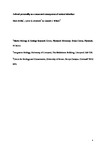Animal personality as a cause and consequence of contest behaviour
| dc.contributor.author | Briffa, Mark | |
| dc.contributor.author | Sneddon, LU | |
| dc.contributor.author | Wilson, AJ | |
| dc.date.accessioned | 2015-10-21T13:15:16Z | |
| dc.date.available | 2015-10-21T13:15:16Z | |
| dc.date.issued | 2015-03 | |
| dc.identifier.issn | 1744-9561 | |
| dc.identifier.issn | 1744-957X | |
| dc.identifier.other | ARTN 20141007 | |
| dc.identifier.uri | http://hdl.handle.net/10026.1/3685 | |
| dc.description.abstract |
<jats:p>We review the evidence for a link between consistent among-individual variation in behaviour (animal personality) and the ability to win contests over limited resources. Explorative and bold behaviours often covary with contest behaviour and outcome, although there is evidence that the structure of these ‘behavioural syndromes' can change across situations. Aggression itself is typically repeatable, but also subject to high within-individual variation as a consequence of plastic responses to previous fight outcomes and opponent traits. Common proximate mechanisms (gene expression, endocrine control and metabolic rates) may underpin variation in both contest behaviour and general personality traits. Given the theoretical links between the evolution of fighting and of personality, we suggest that longitudinal studies of contest behaviour, combining behavioural and physiological data, would be a useful context for the study of animal personalities.</jats:p> | |
| dc.format.extent | 20141007-20141007 | |
| dc.format.medium | Print-Electronic | |
| dc.language | en | |
| dc.language.iso | eng | |
| dc.publisher | The Royal Society | |
| dc.subject | personality | |
| dc.subject | repeatability | |
| dc.subject | contest | |
| dc.subject | aggression | |
| dc.subject | fight | |
| dc.title | Animal personality as a cause and consequence of contest behaviour | |
| dc.type | journal-article | |
| dc.type | Journal Article | |
| plymouth.author-url | https://www.webofscience.com/api/gateway?GWVersion=2&SrcApp=PARTNER_APP&SrcAuth=LinksAMR&KeyUT=WOS:000372711000002&DestLinkType=FullRecord&DestApp=ALL_WOS&UsrCustomerID=11bb513d99f797142bcfeffcc58ea008 | |
| plymouth.issue | 3 | |
| plymouth.volume | 11 | |
| plymouth.publication-status | Published | |
| plymouth.journal | Biology Letters | |
| dc.identifier.doi | 10.1098/rsbl.2014.1007 | |
| plymouth.organisational-group | /Plymouth | |
| plymouth.organisational-group | /Plymouth/Faculty of Science and Engineering | |
| plymouth.organisational-group | /Plymouth/Faculty of Science and Engineering/School of Biological and Marine Sciences | |
| plymouth.organisational-group | /Plymouth/REF 2021 Researchers by UoA | |
| plymouth.organisational-group | /Plymouth/REF 2021 Researchers by UoA/UoA04 Psychology, Psychiatry and Neuroscience | |
| plymouth.organisational-group | /Plymouth/Research Groups | |
| plymouth.organisational-group | /Plymouth/Research Groups/Marine Institute | |
| plymouth.organisational-group | /Plymouth/Users by role | |
| plymouth.organisational-group | /Plymouth/Users by role/Academics | |
| plymouth.organisational-group | /Plymouth/Users by role/Researchers in ResearchFish submission | |
| dc.publisher.place | England | |
| dc.rights.embargodate | 2016-03-01 | |
| dc.rights.embargodate | 2016-03-01 | |
| dc.identifier.eissn | 1744-957X | |
| dc.rights.embargoperiod | 12 months | |
| rioxxterms.versionofrecord | 10.1098/rsbl.2014.1007 | |
| rioxxterms.licenseref.uri | http://www.rioxx.net/licenses/under-embargo-all-rights-reserved | |
| rioxxterms.type | Journal Article/Review |


